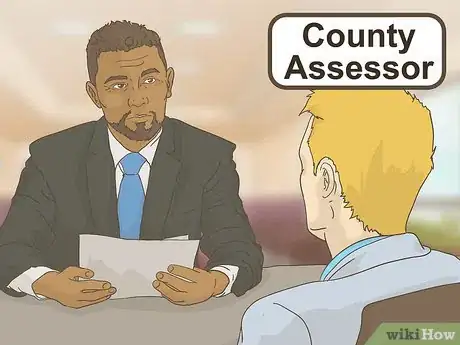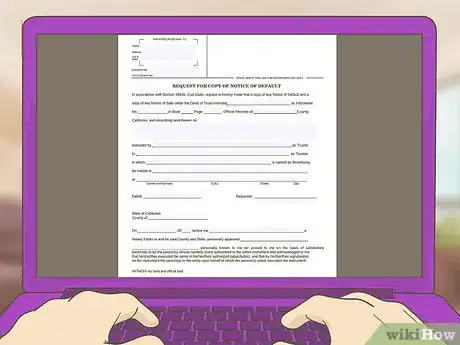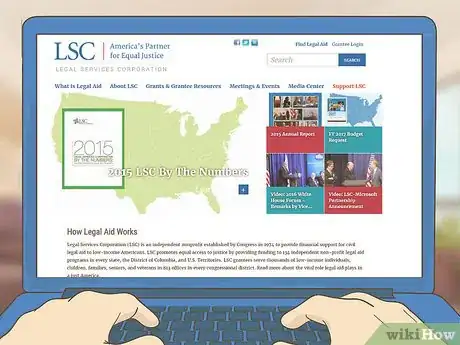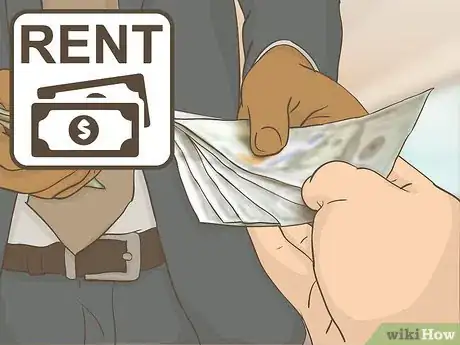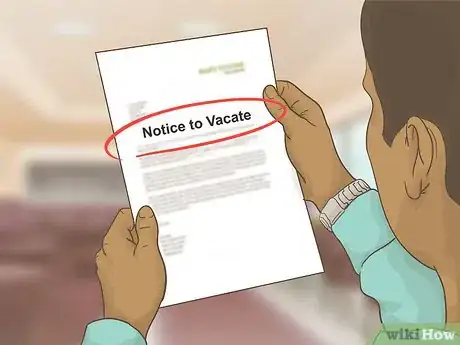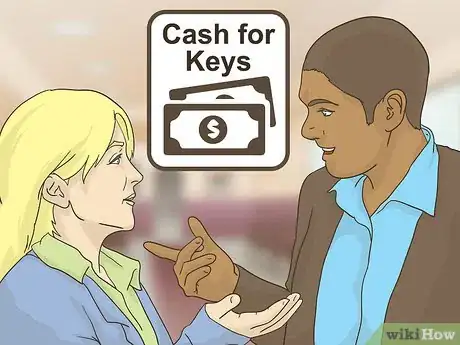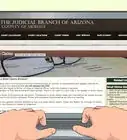This article was co-authored by wikiHow Staff. Our trained team of editors and researchers validate articles for accuracy and comprehensiveness. wikiHow's Content Management Team carefully monitors the work from our editorial staff to ensure that each article is backed by trusted research and meets our high quality standards.
There are 13 references cited in this article, which can be found at the bottom of the page.
This article has been viewed 38,148 times.
Learn more...
When a landlord sells your apartment building, you typically must leave. The new owner probably wants the building empty. For this reason, you’ll need as much advance notice as possible. To find out if your landlord is in foreclosure, you should contact your county assessor’s office or Recorder of Deeds office. Alternately, you might file a request to be notified. The process differs depending on your state.
Steps
Checking if Your Landlord is in Foreclosure
-
1Notice warning signs of default. You might have no idea your landlord is in financial stress. However, there are some common warning signs. Pay attention to the following:[1]
- Your landlord hasn’t been performing regular maintenance. If the lawn isn’t mowed and the building is allowed to fall into disrepair, then there may be a problem.
- Your landlord hasn’t made requested repairs. If your request for repairs is being ignored, then your landlord might be having financial difficulties.
- Notification of foreclosure has been posted on bulletin boards in common areas. Check regularly.
-
2Receive notice. In some states, the law requires that the bank provide you notice before the foreclosure sale. For example, in Washington, you must receive 120 days notice.[2] If you receive this notice, take it seriously.
- Your landlord might catch up on past-due payments, which could take the property out of foreclosure. However, you should double-check with the bank.
- The bank might not tell you much information. In that situation, you should perform a public records search.
Advertisement -
3Perform a public records search. Visit your county land records office. This might be called the Recorder of Deeds or Recorder’s Office.[3] Tell the clerk you are checking to see if a property is in foreclosure. This is public information.
- You may be able to look up this information on a computer at the Recorder of Deeds office. Ask for help if you don't know how.
-
4Visit your county courthouse. The foreclosure process begins with a lawsuit. Accordingly, you can find out if your landlord is in foreclosure by check court documents, which are public. Visit the courthouse in your county. You can check on the status of the case by pulling the case file.[4]
- Look up cases according to the names of the parties. Figure out your landlord’s name—it might be a corporation.
- Generally, there should be a computer you can use at the courthouse to find cases. Write out the case number and give the slip to the clerk, who can pull the file.
-
5Check with the county assessor. There should be a website you can use. If not, stop into the office. You may need the building’s Property Identification Number in order to check.[5]
- Alternately, you might be able to look up information using only the address and the landlord's name.
-
6Request notification of default. In some states, you can request notice be sent to you of any foreclosure hearing. In this way, you’ll know exactly when your landlord goes into foreclosure. The method for requesting this information will differ by state.
- For example, in North Carolina, you can take a copy of your lease to the Recorder of Deeds office and record it. By recording it, you become entitled to notice of any foreclosure hearing.[6]
- In California, you can file a Request for Copy of Notice of Default. You’ll need a form, which is available here: http://www.foreclosureforum.com/forms/request_notice.pdf. You must file this notarized form with your County Recorders office for a fee.[7]
- Search online or talk to a lawyer about the process in your state.
Exercising Your Rights in Foreclosure
-
1Check your state law. Each state is different. In some states, the new owner can evict you from the apartment. However, in other states, you can’t be evicted if you recorded your lease before the mortgage.[8] You should research your law online.
- Also check in with a lawyer. Money might be tight, but legal aid offices can provide you with legal advice about your rights and responsibilities if the building is sold in a foreclosure sale. You can find legal aid by visiting the Legal Services Corporation’s website at http://www.lsc.gov.
- Also contact the National Low Income Housing Coalition.[9] They have information about the foreclosure process.
- If you are Section 8, then contact your nearest Housing and Urban Development (HUD) office.[10]
-
2Answer any court papers. If you were given notice by a court, you need to answer the court. The purpose of the answer is to confirm that you are renting the property. Go to your county court clerk’s office.[11]
- You’ll need to file an answer. This document should contain your name and address, and also state you are living in the property and paying rent. You’ll probably also need to attach a copy of your lease.
- The court might have a form you can fill out as your answer. Check the website or ask the court clerk.
-
3Continue to pay rent. Generally, you must continue to pay your landlord rent during the foreclosure process.[12] Until the building is sold, your landlord is the owner, so make checks out to them. Foreclosure actions can take six months or so to complete.[13]
- Decide whether you want to pay rent to the new owner once the building has been sold. You don’t have a legal contract (lease) with them. Instead, you can wait to receive your notice to vacate, which means they plan to evict you.
- If you are Section 8, notify HUD that the ownership has changed.
-
4Check what happens to your deposit. Your state law should tell the landlord what they must do with your deposit. Generally, they may need to refund it to you or transfer it to the new owner.[14] Contact the current landlord and ask about the deposit money.
- Keep hounding them. A landlord in foreclosure probably has a lot of problems and is very stressed. Their instinct might be to ignore your concerns. However, this is your money and you need to know what is happening with it.
- You may need to sue your landlord if they don’t refund the money or transfer it to the new owner. Talk with a lawyer.
-
5Receive a notice to vacate. Your state law will tell the new landlord how they can evict you. Typically, they’ll need to give you notice to vacate. This should be written notice sent to you. It should tell you how much time you have to leave, e.g., 60 days.[15]
- If you don’t move out by the deadline, then your landlord will have to begin eviction proceedings. They’ll have to go into court to start the proceedings.
- Your landlord shouldn’t use self-help to remove you. For example, a landlord can’t cut off your utilities, change your locks, throw your stuff on the sidewalk, or threaten you. If they do, call the police.
-
6Ask for money to move out. If you receive a notice to vacate, you can offer to move immediately for money. This is called “cash for keys.” Basically, you give up your right to stay in the apartment for cash payment.
-
7Sign a new lease. The new owner might want to keep you as a tenant. If so, you can continue with the lease or sign a new lease with the landlord. Depending on where you live, your new landlord might have created a month-to-month tenancy by accepting your rent check.
-
8Consider suing your old landlord. Depending on where you live, you might be able to sue your old landlord for violating the terms of your lease. Talk with a lawyer about whether this is a good option. You might be able to get compensation for the following:[18]
- moving expenses
- loss of security deposit
- cost of new security deposit
- difference in rent (if your new place costs more)
- any other expenses incurred in finding a new home
References
- ↑ https://ncdoj.gov/protecting-consumers/home-repair-and-products/renters-and-foreclosure/
- ↑ http://www.tenantsunion.org/en/rights/foreclosure-facts
- ↑ http://www.tenantsunion.org/en/rights/foreclosure-facts
- ↑ http://lcbh.org/resources/how-find-out-if-your-building-foreclosure-cook-county
- ↑ http://lcbh.org/resources/how-find-out-if-your-building-foreclosure-cook-county
- ↑ https://ncdoj.gov/protecting-consumers/home-repair-and-products/renters-and-foreclosure/
- ↑ https://www.thebalance.com/tenants-rights-in-foreclosures-1798471
- ↑ https://ncdoj.gov/protecting-consumers/home-repair-and-products/renters-and-foreclosure/
- ↑ http://nlihc.org/about
- ↑ https://www.thebalance.com/tenants-rights-in-foreclosures-1798471
- ↑ http://www.miamidade.gov/business/library/flyers/foreclosured-property-renters.pdf
- ↑ http://ctlawhelp.org/landlord-foreclosure#
- ↑ http://www.lawhelpny.org/resource/when-your-landlord-is-in-foreclosure?lang=EN
- ↑ http://www.tenantsunion.org/en/rights/foreclosure-facts
- ↑ http://www.tenantsunion.org/en/rights/foreclosure-facts
- ↑ https://www.thebalance.com/tenants-rights-in-foreclosures-1798471
- ↑ http://www.tenantsunion.org/en/rights/foreclosure-facts
- ↑ https://www.thebalance.com/tenants-rights-in-foreclosures-1798471




